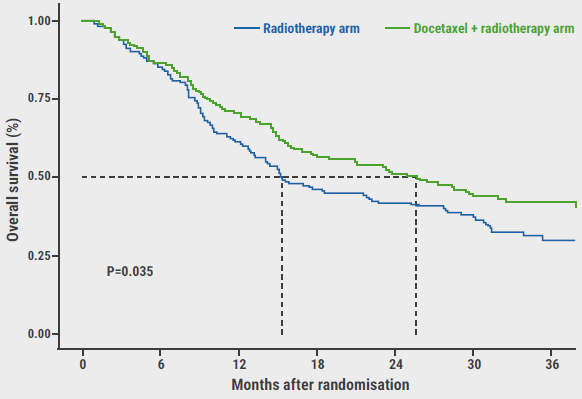
It is my pleasure to share with you our summary of this year’s annual meeting of the American Society of Clinical Oncology (ASCO), which took place as usual in Chicago.
You will find challenging results, both intellectually speaking as well as clinical: Are there intrinsic differences in CDK4 inhibitors or should we further define hormone receptor-positive metastatic breast cancer (mBC) patients who could best benefit from treatment? We will have to look closer to HER2 status results from our patients, as mBC patients seem to benefit from the targeting conjugate agent trastuzumab deruxtecan – even if they have low expression! Personalised medicine for BC advances with new potentially clinical relevant prognostic biomarkers both in locally advanced BC as well as in ductal carcinoma in situ.
As invasive treatments become safer and easier accessible, there is a tendency to integrate them more and more in oligometastatic disease. A new study provides evidence that this may not be beneficial in BC, underlining the need for evidence-based treatment decision-making rather than “common sense”. And maybe I should mention the highly paradigm-changing LUMINA study which may lead to spare patients with very early, good prognosis BC to undergo adjuvant radiotherapy (of course, peer-reviewed published results as well as more long-term follow-up are mandated).
In non-small cell lung cancer, long-term (5 yr) results of the Checkmate 224 trial seem to point to a clear advantage of double checkpoint inhibition over standard chemotherapy with quite impressive overall survival results even in patients with low or absent PD-L1 scores.
New patients with rectal cancer may have lately approached you, declaring that they no longer required surgery nor radiotherapy, just this new drug from America… This somewhat misleading information derives from a phase 2 study with neoadjuvant dostarlimab (a PD-1 inhibitor) in mismatch repair-deficient stage II and III rectal adenocarcinomas – leading to a 100% response rate (yes it is!) – without concurrent or consecutive chemo- or radiotherapy, clearly showing the power of immune checkpoint blocade in microsatellite instability-high or mismatch repair-deficient tumours. However, it is too early to conclude practice changes for our localised or locally advanced rectum cancer patients.
This is of course just my selection of our selection of ASCO this year. So, please sit back and check out what is new as from today, on your own.
Yours, sincerely
Stefan Rauh
Biography
Dr Stefan Rauh is currently working as haematooncologist in the oncology department of Centre Hospitalier Emile Mayrisch, Esch, Luxembourg. He is mainly involved in clinical work but also in research and teaching activities and is interested in public policy and international cooperation projects in oncology. He is member of the ESMO Practicing Oncologist’s Working Group since 2011 (chair 2014-2018), member of the ESMO Public Policy Committee, and has been an ESMO Executive Board member in 2015-2016. He is coauthor of the 2017 ESMO European Cancer Patient Coalition (ECPC) Patient Survivorship Guide and an invited expert for the ECPC.
Conflict of Interest Statement: Nothing to declare.
Copyright ©2023 Medicom Medical Publishers
Posted on
Previous Article
« Bacterial decolonisation effective against radiation dermatitis Next Article
NLC 2022 Highlights Podcast »
« Bacterial decolonisation effective against radiation dermatitis Next Article
NLC 2022 Highlights Podcast »
Table of Contents: ASCO 2022
Featured articles
Breast Cancer
Sacituzumab govitecan meets primary endpoint
Shaky OS results of palbociclib in ER-positive/HER2-negative breast cancer
Practice-changing results of T-DXd in HER2-low breast cancer
SET2,3 to inform on chemotherapy decisions in ER-positive breast cancer
Metastasis-directed therapy fails in oligometastatic breast cancer
Analysis by residual cancer burden further clarifies effect of pembrolizumab
Contribution of metastatic therapies on mortality reduction in breast cancer
Radiotherapy may be omitted in breast cancer patients
Promising data for ribociclib after progression on ET plus CDK4/6 inhibitors in HR-positive/HER2-negative metastatic breast cancer
7-gene biosignature: Benefits of endocrine therapy and radiotherapy in breast cancer risk groups
Lung Cancer
Additional tiragolumab does not help patients with untreated small cell lung cancer
Success for serplulimab plus chemotherapy in small cell lung cancer
Adagrasib safe and clinically active in non-small cell lung cancer
Long-term benefits of combined immunotherapy over chemotherapy in non-small cell lung cancer
Effect of KRAS mutations and PD-L1 expression on therapy response in non-small cell lung cancer
Melanoma
First results on distant metastasis-free survival in stage II melanoma
Higher response rates for concurrent triple therapy versus sequential therapy in melanoma
Genitourinary Cancers
Exploratory treatment options fail in ccRCC
Adjuvant everolimus did not benefit high-risk renal cell carcinoma
Cabozantinib fails as first-line maintenance therapy in urothelial cancer
177Lu-PSMA-617 is a valid treatment option for PSMA-positive mCRPC
Enzalutamide performs well in metastatic hormone-sensitive prostate cancer
Haematologic Malignancies
Autologous stem cell transplantation plus RVd improves PFS in multiple myeloma
Novel first-line treatment option for mantle cell lymphoma
Promising results for novel CAR-T therapy in relapsed/refractory multiple myeloma
Gastrointestinal Cancers
Panitumumab beats bevacizumab in RAS wildtype left-sided metastatic colorectal cancer
Spectacular results for dostarlimab in mismatch repair deficient rectal cancer
Triplet chemotherapy beats doublet chemotherapy in colorectal cancer liver metastases
To resect or not to resect primary tumours in stage IV colon cancer?
Novel treatment option for KRAS wildtype pancreatic cancer
Gynaecological Cancers
Primary results of rucaparib in ovarian cancer
Trabectedin not superior to chemotherapy in recurrent epithelial ovarian cancer
Encouraging results of relacorilant in ovarian cancer
Miscellaneous Topics
Bacterial decolonisation effective against radiation dermatitis
New standard-of-care for cisplatin-ineligible locally advanced head and neck squamous cell carcinoma
Ifosfamide is likely to be the go-to therapy in recurrent Ewing sarcoma
Dabrafenib plus trametinib candidates for standard-of-care in BRAF V600-mutated paediatric low-grade glioma
© 2024 Medicom Medical Publishers. All rights reserved. Terms and Conditions | Privacy Policy
HEAD OFFICE
Laarderhoogtweg 25
1101 EB Amsterdam
The Netherlands
T: +31 85 4012 560
E: publishers@medicom-publishers.com



